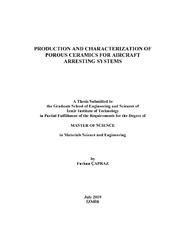Please use this identifier to cite or link to this item:
https://hdl.handle.net/11147/7338Full metadata record
| DC Field | Value | Language |
|---|---|---|
| dc.contributor.advisor | Ahmetoğlu, Çekdar Vakıf | - |
| dc.contributor.advisor | Adem, Umut | - |
| dc.contributor.author | Çapraz, Furkan | - |
| dc.date.accessioned | 2019-11-06T08:30:47Z | - |
| dc.date.available | 2019-11-06T08:30:47Z | - |
| dc.date.issued | 2019-07 | - |
| dc.identifier.citation | Çapraz, F. (2019). Production and characterization of porous ceramics for aircraft arresting systems. Unpublished master's thesis, İzmir Institute of Technology, İzmir, Turkey | en_US |
| dc.identifier.uri | https://hdl.handle.net/11147/7338 | - |
| dc.description | Thesis (Master)--Izmir Institute of Technology, Materials Science and Engineering, Izmir, 2019 | en_US |
| dc.description | Full text release delayed at author's request until 2020.02.23 | en_US |
| dc.description | Includes bibliographical references (leaves: 55-60) | en_US |
| dc.description | Text in English; Abstract: Turkish and English | en_US |
| dc.description.abstract | Despite developments in aviation, accidents still occur and lead to loss of lives. Technical or environmental factors may cause overrun accidents. In the case of aircraft that fail to stop along the runway distance during take-off or landing, such accidents are called overrun. Aircraft stopping systems (AAS) are passive safety systems used to prevent to take damage of passengers and aircraft during overrun. In the literature, foamed concrete was generally used as the AAS material. However, some studies have also been carried out on other materials that may be used as the AAS material. In present thesis, the aim was to produce porous calcium silicates instead of foamed concrete in AAS. The slip casting method was used to produce porous calcium silicate monoliths. The main components used in the manufacturing of porous wollastonite were xonotlite (as a matrix material), polymethyl methacrylate (as a sacrificial pore former, PMMA), polyvinyl alcohol (as a binder, PVA), Dolapix CE 64 (as a dispersing agent) and distilled water. Three different xonotlite ratios (8, 9 and 10% by volume) have been studied with four different xonotlite/ PMMA ratios (1, 0.82, 0.54 and 0.33 by volume). Also, specimens without PMMA were produced for each xonotlite ratio. The suspensions were stirred for 3 h at 750 rpm and then casted into the gypsum mold. The samples which were dried at room temperature (RT) were heat treated at 1000 oC. After production step microstructural, structural and mechanical analysis o the porous calcium silicates were carried out. Cold Crushing Strength (CCS) tests were performed out for determining mechanical properties. CCS values of the porous monolith parts ranged between 1376 kPa and 53.2 kPa depending on xonotlite/ PMMA ratios. In addition, the porosity values ranged from 93.38 to 87.82%. The resuts showed that some of these porous calcium silicate monoliths are suitable to use instead of foamed concrete as the AAS material. | en_US |
| dc.description.abstract | Havacılıktaki gelişmelere rağmen halen uçak kazaları can kayıplarına yol açmaktadır. Pistten çıkma kazaları teknik veya çevresel faktörler nedeniyle uçağın kalkış veya iniş sırasında pist mesafesi boyunca durmaması olarak adlandırılmaktadır. Uçak Durdurma Sistemleri pistten çıkma kazalarında yolcuların ve uçağın hasar almasını engelleyen pasif güvenlik sistemleridir. Literatürde Uçak Durdurma Sistemi malzemesi olarak genellik köpürtülmüş beton kullanılmıştır. Ancak Uçak Durdurma Sistemi malzemesi olarak kullanılabilecek diğer malzemeler üzerinde de bazı çalışmalar gerçekleştirilmiştir. Bu tezde, Uçak Durdurma Sistemi malzemesi olarak köpürtülmüş beton yerine kullanılabilecek gözenekli kalsiyum silikat üretimi amaçlanmıştır. Monotlitik gözenekli kalsiyum silikatların üretimi için askıda döküm yöntemi kullanılmıştır. Ana malzeme olarak xonotlite (temel malzeme), polimetilmetakrilat (kurban gözenek yapıcı, PMMA), polivinil alkol (bağlayıcı, PVA), Dolapix CE 64 (dağıtıcı ajan) ve su kullanılmıştır. Üç farklı xonotlite oranı (hacmce %8, 9 ve 10) ile dört farklı xonotlite/ PMMA oranı (hacimce 1, 0.82, 0.54 ve 0.33) üzerinde çalışılmıştır. Ayrıca tüm xonotlite oranları için PMMA içermeyen numuneler üretilmiştir. Süspansiyonlar, 3 saat boyunca 750 rpm'de karıştırılmıştır ve sonra alçı kalıba dökülmüştür. Oda sıcaklığında kurutulan numunelere 1000 oC’de ısıl işlem uygulanmıştır. Üretim basamağından sonra mikroyapısal, yapısal ve mekanik analizler gerçekleştirilmiştir. Soğuk Kırılma Mukavemeti testi mekanik dayanımın belirlenmesi için gerçekleştirilmiştir. Gözenekli monolitlerin Soğuk Kırılma Mukavemeti, xonotlite/ PMMA oranlarına bağlı olarak 1376 kPa ile 53,2 kPa arasında değişmiştir. Bunun yanında gözeneklilik değerleri % 93.38 ile 87.82 arasında değişmiştir. Sonuçlar göstermektedir ki bazı gözenekli kalsiyum silikat monolitleri Uçak Durdurma Sistemlerinde köpürtülmüş beton yerine kullanılmaya uygundur. | en_US |
| dc.format.extent | xi, 60 leaves | - |
| dc.language.iso | en | en_US |
| dc.publisher | Izmir Institute of Technology | en_US |
| dc.rights | info:eu-repo/semantics/openAccess | en_US |
| dc.subject | Pierced ceramics | en_US |
| dc.subject | Industrial ceramics | en_US |
| dc.subject | Aircraft stopping systems | en_US |
| dc.subject | Porous calcium silicates | en_US |
| dc.title | Production and Characterization of Porous Ceramics for Aircraft Arresting Systems | en_US |
| dc.title.alternative | Uçak Durdurma Sistemleri için Gözenekli Seramiklerin Üretimi ve Karakterizasyonu | en_US |
| dc.type | Master Thesis | en_US |
| dc.institutionauthor | Çapraz, Furkan | - |
| dc.department | Thesis (Master)--İzmir Institute of Technology, Materials Science and Engineering | en_US |
| dc.request.email | frkncprz@gmail.com | - |
| dc.request.fullname | Furkan Çapraz | - |
| dc.relation.publicationcategory | Tez | en_US |
| dc.identifier.wosquality | N/A | - |
| dc.identifier.scopusquality | N/A | - |
| item.grantfulltext | open | - |
| item.openairecristype | http://purl.org/coar/resource_type/c_18cf | - |
| item.openairetype | Master Thesis | - |
| item.languageiso639-1 | en | - |
| item.cerifentitytype | Publications | - |
| item.fulltext | With Fulltext | - |
| Appears in Collections: | Master Degree / Yüksek Lisans Tezleri | |
Files in This Item:
| File | Description | Size | Format | |
|---|---|---|---|---|
| 10171953.pdf | MasterThesis | 4.73 MB | Adobe PDF |  View/Open |
CORE Recommender
Page view(s)
404
checked on Apr 28, 2025
Download(s)
378
checked on Apr 28, 2025
Google ScholarTM
Check
Items in GCRIS Repository are protected by copyright, with all rights reserved, unless otherwise indicated.